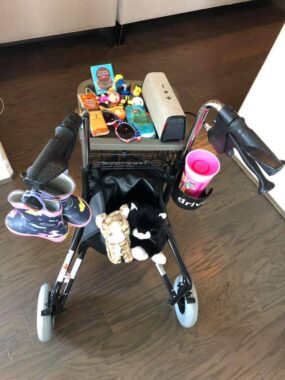The innocence of children is a wondrous thing
Children's curiosity and acceptance are an opportunity to educate about disability
Written by |

One of my favorite aspects of motherhood is getting a glimpse of the way young children experience the world around them by hearing their observations and fielding their questions.
As the mom of two active, social, and athletic kids — a 5-year-old daughter, Collins, and an 8-year-old son, Brooks — I’m around kids constantly. Mine are used to my disabilities and challenges. They’ve accepted that mobility aids are a staple in my life.
While they occasionally ask questions and express compassion or concern for my reality, they generally just roll with the punches, accepting that their mom has a disability. That being said, I realize that my kids have a unique relationship with disabilities in their daily lives that most children don’t have.
Throughout the years, as my Friedreich’s ataxia (FA) symptoms have progressed and demanded certain adaptations, one thing has remained constant: Seeing my situation through the eyes of a child is the best perspective, and sometimes a wakeup call.
Here comes the ‘Snack Wagon’
When I first started using my walker around the house in 2019, my kids loved it. We nicknamed it the “Snack Wagon,” and its basket and tray were quickly occupied with crackers, sippy cups, clementines, toys, fruit snacks, discarded clothes, wipes, and more. It became a trusty refreshment station and a reliable mode of transportation for everything their little arms couldn’t hold.
My kids’ friends quickly caught on to this and would frequently help themselves to my walker. I remember one boy in my daughter’s preschool class whose face would light up when he saw me rolling in. He’d make a beeline for me, say hello, and then immediately start fidgeting with my walker and shopping around in it for treats. He thought it was the coolest accessory and once said he wished his mom had a Snack Wagon. It’s hard to resent a walker that brings so much innocent joy in moments like that.

The “Snack Wagon” in action. (Photo by Kendall Harvey)
I could share hundreds of funny, innocent, and happy interactions like that. Kids are so curious and observant and often lack filters. I’ve been asked countless times why I use a walker, and when I say, “My legs don’t work very well, so I use this to help keep me safe from falling over while walking,” they accept the answer and usually respond with some sweet and simple response, like “Cool!” Or “I like the purple!” Or “My grandma has one like that!”
As my kids get older, so do their friends. I worried that our interactions would become less lighthearted and more awkward, but that hasn’t been the case. The questions they ask and the observations they make only become wiser and more compassionate.
One day when I was a library helper at school, I parked my walker off to the side and used the desk for support while standing and scanning out books. A girl said, “Hey, you should call your walker a stander when you aren’t walking with it!” Kids offer to open doors for me and ask if my legs ever hurt. Boys ask how the brakes work, while girls decorate it with stickers or see past it and just interact with me.
My electric mobility scooter has a speed-control dial with a turtle icon for “slow” and a rabbit icon for “fast.” This fascinates one of the girls I see regularly at my son’s lacrosse games, and when I roll up in my scooter, she excitedly asks if I’m in turtle or rabbit mode.
All of this is to say that the disabled community has a real opportunity to normalize disabilities with the next generation. All we have to do is be intentional with our interactions.
I often think about the lasting impact I can have on kids who don’t regularly see disabled people, young or older, using mobility aids. This perspective reminds me that these kids are learning how to be humans from us adults, and that’s not a responsibility I take lightly. I allow them to ask questions, accept their offers to help, indulge their curiosity, praise their kindness, and strive to make my interactions positive so that they’ll grow up with healthy and positive views and memories of people with disabilities.
You never know what impact this might have. These kids could grow up to become scientists determined to find a cure for their old classmate’s mom!
“Direct your children onto the right path, and when they are older, they will not leave it.” — Proverbs 22:6 (NLT)
Note: Friedreich’s Ataxia News is strictly a news and information website about the disease. It does not provide medical advice, diagnosis, or treatment. This content is not intended to be a substitute for professional medical advice, diagnosis, or treatment. Always seek the advice of your physician or another qualified health provider with any questions you may have regarding a medical condition. Never disregard professional medical advice or delay in seeking it because of something you have read on this website. The opinions expressed in this column are not those of Friedreich’s Ataxia News or its parent company, Bionews, and are intended to spark discussion about issues pertaining to Friedreich’s ataxia.




Leave a comment
Fill in the required fields to post. Your email address will not be published.